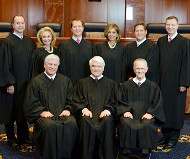4/10/2015
Texas Supreme Court Rejects Red Light Camera ArgumentsTexas Supreme Court refuses to block anti-camera election in Arlington, orders disclosure of camera related accident data in Houston.

A red light camera court case has yet to reach the highest court in Texas, but justices have recently issued a pair of orders that dealt a setback to the automated ticketing industry. Last week, the judges denied the request of attorneys for American Traffic Solution (ATS) who begged the Supreme Court to intervene in an upcoming election to prevent residents of Arlington from voting on a red light camera ban.
Last month, a Tarrant County judge said he lacked the jurisdiction to block the May 9 ballot item. Without elaborating, the Supreme Court issued an order denying the appeal of ATS lawyer Andy Taylor.
In another little noticed decision last month, the state Supreme Court dealt a legal blow to the automated ticketing industry in a case stemming from the city of Houston's failed effort to keep its citizens from voting out red light cameras five years ago. Although residents voted down red light cameras by a healthy margin in November 2010, the city refused to turn over documents detailing the number of accidents at photo enforced intersections in advance of the vote. Randall Kallinen and Paul Kubosh, organizers of the successful anti-camera referendum, filed a lawsuit to get the data.
In a highly technical legal maneuver, Houston requested a decision from the attorney general on whether the information could be withheld or not. The city then argued Kallinen and Kubosh could not sue to have the requested information released because they had to first exhaust their remedies with the attorney general. The high court rejected the city's claim.
"[Public information] requestors cannot be required to finish something they have no right to start," the justices wrote in a per curiam decision. "The requirement that a governmental body seek a ruling from the attorney general when withholding requested information is a check on the governmental body, not a remedy for the requestor to exhaust."
Non-profit groups, including Communities United Against Police Brutality, filed friend of the court briefs supporting Kallinen out of fear that the Houston precedent would be used to hide official misconduct.
"To require an attorney general ruling before a requestor may bring an action to compel the disclosure of public information constitutes a loophole, giving a governmental body a chance to avoid having to supply public information," the group wrote. "If a governmental body can delay supplying public information, this allows the temporary suppression of mistakes or irregularities that should be immediately open to the scrutiny of the press and the general public."
The justices remanded the case to the lower court for further proceedings. A copy of the ruling is available in a 70k PDF file at the source link below.


